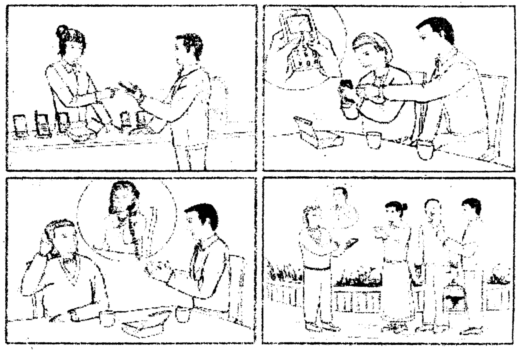15.It was the afternoon of December 24,the day before Christmas;and as the newest doctor in our office,I had to work.The only thing that (36)Bmy day was the beautifully decorated Christmas tree in our waiting room and a (37)Csent to me by a fellow I was dating-a dozen long-stemmed red roses.
Then I was told a lady (38)Aneeded to speak with me.As I stepped out,I noticed a young,tired-looking woman with a (39)Din her arms.Nervously,she (40)A that her husband-a prisoner in a nearby prison-was my (41)D patient.She told me she wasn't (42)B to visit her husband in prison and that he had never seen his (43)C.Her request was for me to let the boy's father sit in the waiting room with her as (44)c as possible before I called him for his appointment.I agreed.(45)A,it was Christmas Eve.
Her husband arrived-with chains on his feet and hands,and two armed guards.The woman's tired face (46)B like our Christmas (47)D when her husband took a seat beside her.After almost an hour,I called the (48)A to my office.
At the end of the (49)C,I wished him a Merry Christmas-a(n) (50)B thing to say to a man headed back to prison.He(51)D and thanked me.He also said he felt (52)C by the fact he hadn't been able to get his wife anything for Christmas.On (53)A this,I was inspired with a wonderful idea.
I'll never forget the look on both their faces as the prisoner gave his wife the beautiful (54)B.I'm not sure who experienced the most joy-the husband in giving,the wife in (55)D,or myself in having the opportunity to share in this special moment.
Then I was told a lady (38)Aneeded to speak with me.As I stepped out,I noticed a young,tired-looking woman with a (39)Din her arms.Nervously,she (40)A that her husband-a prisoner in a nearby prison-was my (41)D patient.She told me she wasn't (42)B to visit her husband in prison and that he had never seen his (43)C.Her request was for me to let the boy's father sit in the waiting room with her as (44)c as possible before I called him for his appointment.I agreed.(45)A,it was Christmas Eve.
Her husband arrived-with chains on his feet and hands,and two armed guards.The woman's tired face (46)B like our Christmas (47)D when her husband took a seat beside her.After almost an hour,I called the (48)A to my office.
At the end of the (49)C,I wished him a Merry Christmas-a(n) (50)B thing to say to a man headed back to prison.He(51)D and thanked me.He also said he felt (52)C by the fact he hadn't been able to get his wife anything for Christmas.On (53)A this,I was inspired with a wonderful idea.
I'll never forget the look on both their faces as the prisoner gave his wife the beautiful (54)B.I'm not sure who experienced the most joy-the husband in giving,the wife in (55)D,or myself in having the opportunity to share in this special moment.
| 36.A.darkened | B.brightened | C.shortened | D.worsened |
| 37.A.report | B.patient | C.gift | D.message |
| 38.A.urgently | B.strangely | C.regularly | D.unreasonably |
| 39.A.dog | B.box | C.quilt | D.baby |
| 40.A.explained | B.learned | C.realized | D.insisted |
| 41.A.first | B.last | C.best | D.next |
| 42.A.shown | B.allowed | C.persuaded | D.forbidden |
| 43.A.wife | B.doctor | C.son | D.victim |
| 44.A.soon | B.close | C.long | D.quietly |
| 45.A.After all | B.Above all | C.In addition | D.Sure enough |
| 46.A.went red | B.lit up | C.clouded over | D.turned aside |
| 47.A.day | B.cake | C.party | D.tree |
| 48.A.prisoner | B.woman | C.guard | D.others |
| 49.A.preparation | B.celebration | C.appointment | D.punishment |
| 50.A.rude | B.difficult | C.proper | D.easy |
| 51.A.cried | B.shouted | C.disagreed | D.smiled |
| 52.A.amused | B.frightened | C.saddened | D.encouraged |
| 53.A.hearing | B.seeing | C.realizing | D.considering |
| 54.A.clothes | B.roses | C.pictures | D.decorations |
| 55.A.winning | B.meeting | C.borrowing | D.receiving |
8.Wow!That's Uncle Sam.Now he's in Paris,_____ he?( )
| A. | isn't | B. | hasn't | C. | doesn't | D. | wasn't |
7.He's posted the letter,_________ he?( )
| A. | isn't | B. | doesn't | C. | hasn't | D. | wasn't |
6.We feel it amazing that his father always wears a cap____ the season.( )
0 137784 137792 137798 137802 137808 137810 137814 137820 137822 137828 137834 137838 137840 137844 137850 137852 137858 137862 137864 137868 137870 137874 137876 137878 137879 137880 137882 137883 137884 137886 137888 137892 137894 137898 137900 137904 137910 137912 137918 137922 137924 137928 137934 137940 137942 137948 137952 137954 137960 137964 137970 137978 151629
| A. | whatever | B. | whichever | C. | whenever | D. | however |
